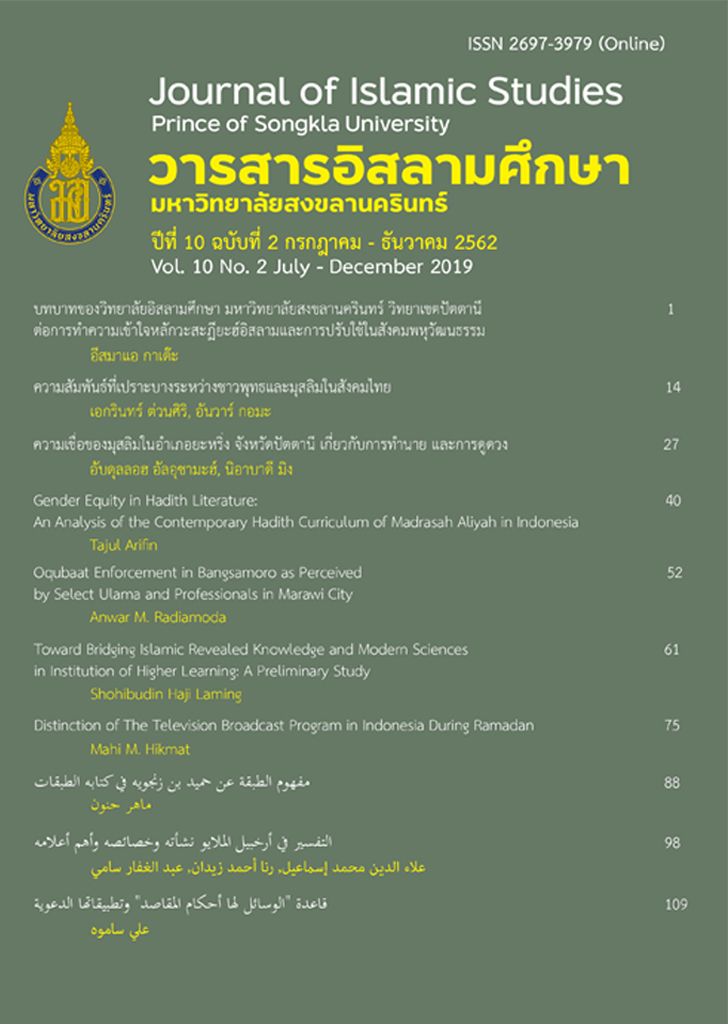Oqubaat Enforcement in Bangsamoro as Perceived by Select Ulama and Professionals in Marawi City
Keywords:
Oqubaat, Bangsamoro, MeranawAbstract
This study aimed to find out the views of the Meranaw, Tausog and Maguindanaon who are Ulama and Professionals in the “Oqubaat Enforcement in Bangsamoro[1] as Perceived by Select Ulama and Professionals in Marawi City” to support the Bangsamoro Organic Law (BOL) which is the main objective of the framework of peace agreement between the Philippine government and the Moro Islamic Liberation Front (MILF) in order to promote peace, order and development in the county. A survey was conducted thru a guided questionnaire to collect the insight of selected respondents to weigh their experiences and perceptions. Understanding Oqubaat Enforcement and its concepts, theories, values and implications will help pave the way for mutual respect, avoid "enmity and antagonism" or clan feuds, the researcher endeavored to conduct a study on this particular issue, with added hope that it contributes something to the educational field. Specifically, this study is significant to the following: (1) Professionals; (2) Meranaw People; (3) Overseas Workers; and (4) Students and Researchers - This study may guide them on how to use ideas and references in establishing values implication in order to achieve peace and development.
[1] Bangsamoro People. The term refers to those who at the time of conquest and colonization were considered natives or original inhabitants of Mindanao and the Sulu archipelago and its adjacent Islands including Palawan, and their descendants, whether or mixed or of full blood, shall have the right to identify themselves as Bangsamoro by ascription or self-ascription. Spouses and their descendants are classified as Bangsamoro. (BBL-Republic act No.6734)
References
Al-hilali, & Khan, Muhammad, M. (1996). The Noble Qur’an (English Translation of the Meanings and Commentary): Al-Madina Al-Munawwarah: Darussalam Printing Corporation.
Al-Jaza-iri, Abu-Bakr J., Minhaj Al M. (2001). [A Book of Creed, Manners, Character, Acts of Worship and other Deeds]. (vol. II); Riyadh: Darussalam Global leader in Islamic Books.
Anwar M. R. (2015). Uqobaat Enforcement: Perceptions of select Ulama and Professionals in Marawi City, Graduate School, Mindanao State University, Marawi City: n.p.
Bahnasi, A. F. (1988). Al-ta'zir fe al-Islam [Ta'zir in Islam]. Cairo: Moasaset Alkhalej Alarabi.
Bahnasi, A. F. (1989). Al-Uqubah Fil-Fiqh Al-Islamie. Cairo: Dar As-Suruk.
Bukhari, M. I. (1996). Sahih al-Bukhari (Vol. VIII). (M. M. Khan, Trans.) Riyadh: Darussalam Publishers & Distributors.
Hasan H. & Muhammad, S. (2008). Fiqh According to the Qur’an and Sunnah. Riyadh: Darussalam Publishers.
Ismail U. (1996), Tafsir Ibn Kathir: International Islamic Publishing House.
Madkoar, Mohammed Salam.Worldview: (n.d.) Human Rights from an Islamic Worldview: An outline of Hudood, Ta'zeer & Qisaas. Retrieved from https://www.islamawareness.net/
Nyazee, I. A. K. (2000). Islamic Jurisprudence: Islamabad, the International Institute of Islamic Thought.
Ouda, A, A. (2009). Al-tashrea' al-gena'e al-Islami mokaranan bel kanon al-wadee [Islam criminal legislation compared with man-made laws]. Cairo: Dar Al-Kotob Al-Elmia.
Sabek, E. (2007). Fiqh Al-sunnh [The jurisprudence of Sunnah]. Beirut: Al-Maktabah Al-A’shriyah.
Tantawi, M. S. (2000). Al-Fiqh Al-Myassar, (Vol. 3), Cairo: Maktabah As-Suruq.
Tahir-UL-Qadri, M. (1984). Punishments in Islam Their Classification & Philosophy. Lahore: Institute of Islamic Studies, Punjab University.
Downloads
Published
How to Cite
Issue
Section
License
Copyright (c) 2019 Journal of Islamic Studies, Prince of Songkla University

This work is licensed under a Creative Commons Attribution 4.0 International License.
All articles Published in The Journal of Islamic Studies are author’s opinions, and not the responsibility of the Faculty of Islamic Sciences nor the editorial board. However any citation should be referred to the journal.
















